译林版五年级英语下册语法知识点总结
译林版五下英语知识点
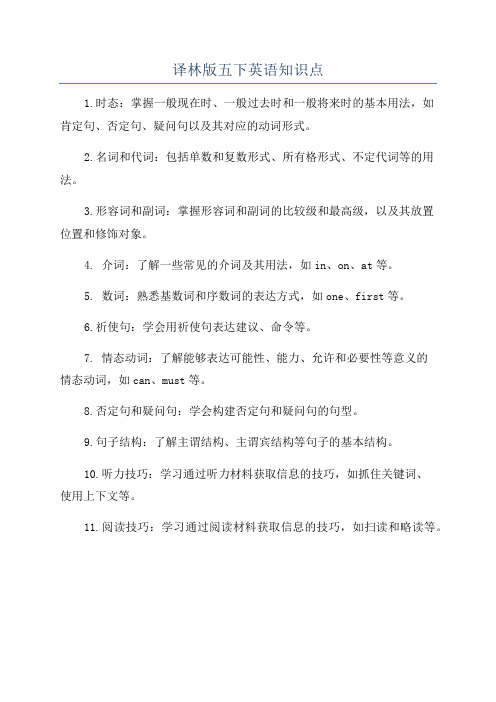
译林版五下英语知识点
1.时态:掌握一般现在时、一般过去时和一般将来时的基本用法,如
肯定句、否定句、疑问句以及其对应的动词形式。
2.名词和代词:包括单数和复数形式、所有格形式、不定代词等的用法。
3.形容词和副词:掌握形容词和副词的比较级和最高级,以及其放置
位置和修饰对象。
4. 介词:了解一些常见的介词及其用法,如in、on、at等。
5. 数词:熟悉基数词和序数词的表达方式,如one、first等。
6.祈使句:学会用祈使句表达建议、命令等。
7. 情态动词:了解能够表达可能性、能力、允许和必要性等意义的
情态动词,如can、must等。
8.否定句和疑问句:学会构建否定句和疑问句的句型。
9.句子结构:了解主谓结构、主谓宾结构等句子的基本结构。
10.听力技巧:学习通过听力材料获取信息的技巧,如抓住关键词、
使用上下文等。
11.阅读技巧:学习通过阅读材料获取信息的技巧,如扫读和略读等。
新译林版英语五年级下册语法知识详解

新译林版英语五年级下册语法知识详解本文将详细介绍新译林版英语五年级下册的语法知识,帮助学生更好地理解和掌握课程内容。
1. 一般现在时一般现在时是表达现在情况或经常性行为的时态。
主语与动词保持一致,即第三人称单数主语使用动词的原形加s。
例如:- I like playing soccer.- He eats an apple every day.2. 一般过去时一般过去时是表达过去发生的事情或状态的时态。
常与表示过去的时间状语连用,如yesterday, last week等。
动词的过去式通常为动词原形加-ed,但也有一些不规则动词需要特殊记忆。
例如:- She watched a movie yesterday.- They visited their grandparents last summer.3. 现在进行时现在进行时表示现在正在进行的动作或发生的事情。
由"be"动词加动词-ing形式构成。
例如:- We are studying English now.- He is playing soccer in the park.4. 情态动词情态动词是用来表示能力、请求、建议、许可、可能性等情态的词汇,常与动词原形搭配使用。
例如:- Can you help me with my homework?- You should eat more vegetables.5. 形容词比较级和最高级形容词比较级用于比较两个人或事物的程度,最高级则用于比较三个以上的人或事物的程度。
常通过在形容词后加-er或-est来构成。
例如:- This book is more interesting than that one.- He is the tallest boy in the class.以上是新译林版英语五年级下册的一些语法知识详解。
希望同学们能通过学习掌握这些知识,提高英语水平。
五年级下册英语-全册知识点归纳-译林版

五年级下册英语-全册知识点归纳译林版5B知识点大纲Unit 1 Cinderella单词prince 王子fairy 仙女why 为什么because 因为clothes 衣服let 让put on 穿上before 在……以前try on 试穿have to 不得不;必须fit 合适,合身take off 脱下mushroom 蘑菇late 迟的,晚的understand 明白,理解pick 摘,拾be bad for 有害的leave ... behind 留下,丢下重点词组1.at the prince’s house 在王子的房子2.so sad 如此伤心3.go to the party 参加舞会4.visit every house 拜访每一间屋子e back 回来6.have a good time 过得愉快7.at the party 在聚会8.take off 脱下9.try on 试穿10.have to go必须走11.leave…behind留下,丢下12.in the forest 在深林里13.under a tree在一棵树下14.pick a big red mushroom摘一个大红色的蘑菇15.look so nice 看起来很漂亮16.be bad for us 对我们有害的17.Money King 美猴王18.read a story about ... 读一个有关……的故事19.be at school 在学校学习重点句型e and help me. 过来帮我。
2.Why are you so sad, dear? 亲爱的,为什么你这样伤心?3.Because I don’t have any nice clothes or shoes. 因为我没有任何漂亮的衣服和鞋子。
4.Hurry up! 快点!5.We can eat them. 我们可以吃它们了。
新版译林英语五年级下册知识点整理

新版译林英语五年级下册知识点整理一、名词1.可数名词与不可数名词2.可数名词单数和复数形式的构成规则3.不可数名词的用法及常见不可数名词4.名词所有格的构成规则5.专有名词的用法及常见专有名词二、代词1.人称代词的用法及主格和宾格的区分2.物主代词的构成及用法3.反身代词的构成及用法4.指示代词的构成及用法5.疑问代词的构成及用法三、形容词1.形容词的用法及位置2.形容词比较级和最高级的构成规则3.形容词比较级和最高级的用法4.形容词的否定形式和副词形式四、动词1.动词的基本形式、过去式和现在分词的构成规则2.动词的时态:一般现在时、一般过去时和一般将来时3.动词的否定句和一般疑问句的构成规则4.动词的现在进行时和一般过去时5.常见动词短语的用法及意义五、副词1.副词的用法及位置2.程度副词的构成及用法3.时间副词和地点副词的用法4.方式副词的构成及用法六、介词1.常见介词的用法及意义2.介词短语的构成及用法3.介词和动词之间的搭配七、冠词1.冠词的用法及区分2.定冠词和不定冠词的用法3.零冠词的用法八、连词1.并列连词的用法及意义2.选择连词和副词从句的用法3.结果连词和原因连词的用法4.时间连词和条件连词的用法九、句子1.陈述句和疑问句的构成和用法2.祈使句和感叹句的构成和用法3.陈述句的肯定句和否定句的构成和用法4.疑问句的一般疑问句和特殊疑问句的构成和用法十、阅读1.阅读理解的基本技巧和策略2.阅读时的关键词和重点定位3.根据上下文推测词义的方法4.根据文章内容回答问题的技巧以上是新版译林英语五年级下册的知识点整理。
通过对这些知识点的学习和掌握,学生们能够提高自己的英语语言能力,进一步巩固和扩展自己的词汇量和语法知识,为更高年级的英语学习打下坚实的基础。
希望同学们能够通过系统学习和不断练习,提高自己的英语水平,更好地与世界沟通交流。
译林版五年级英语下册知识点汇总

译林版小学五年级下册知识点整理Unit1知识点一、单词:because因为fairy仙女fit合适,合身have to不得不,必须leave..behind留下,丢下mushroom蘑菇prince王子understand明白,理解pick摘,拾take off脱下be bad for有害的clothes衣服let让puton穿上before在..以前try on试穿late迟的pick摘二、词组:at the prince's house在王子的房子be sad伤心go to the party去聚会don't have any nice clothes or shoes没有漂亮的衣服或鞋子come back回来have a good time过得愉快at the party在聚会take off脱下try on试穿have to go必须走leave..behind留下,丢下in the forest在深林里under a tree在一棵树下pick a big red mushroom摘一个大红色的磨菇look so nice看起来很漂亮are bad for us对我们有害的1Why are you so sad?你为什么这么伤心?Because I can't go to the party.因为我不能去参加聚会。
Why?为什么?Because I don't have any nice clothes and shoes.因为我没有漂亮的衣服或鞋子。
四、语法:can't=can not don't=do notUnit2知识点一、单词:far from离….远near在.……附近by….乘.…bus公共汽车,大巴士on foot步行metro地铁taxi出租车,的士bike自行车plane飞机ship轮船train火车ride骑车show给……看basket篮子city城市二、词组:your new home你的新家very big很大far from school离学校远live on Moon Street住在月亮街上near City Library在城市图书馆附近come to school来学校by bus乘公共汽车on foot步行by metro乘地铁by taxi乘出租车a taxi driver-位出租车司机in the park在公园里can fly会飞show his bike to sam展示他的自行车给山姆看too young太小(年龄)sit in the basket坐在篮子里2Where do you live?你住在哪里?Ilive.…我住在……I live near/far from..我住在附近/离远How do you come to school?你怎样来学校的?I come to school..我来学校.……Unit3知识点一、单词:along沿着,顺着ask the way问路ask.…for help向…….求助full满的,饱的get to到达next to在……旁边on your right在的右侧。
新译林版英语五年级下册语法知识总结与复习
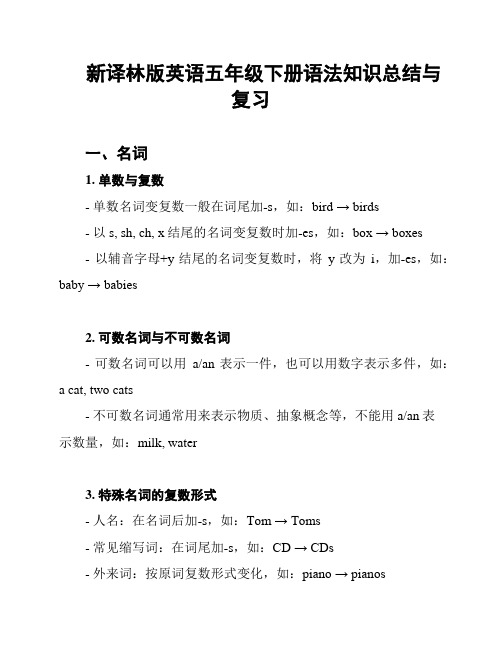
新译林版英语五年级下册语法知识总结与复习一、名词1. 单数与复数- 单数名词变复数一般在词尾加-s,如:bird → birds- 以s, sh, ch, x结尾的名词变复数时加-es,如:box → boxes- 以辅音字母+y结尾的名词变复数时,将y改为i,加-es,如:baby → babies2. 可数名词与不可数名词- 可数名词可以用a/an表示一件,也可以用数字表示多件,如:a cat, two cats- 不可数名词通常用来表示物质、抽象概念等,不能用a/an表示数量,如:milk, water3. 特殊名词的复数形式- 人名:在名词后加-s,如:Tom → Toms- 常见缩写词:在词尾加-s,如:CD → CDs- 外来词:按原词复数形式变化,如:piano → pianos二、动词1. 动词的时态- 一般现在时:表示现在经常性的动作或状态,如:I study English every day.- 一般过去时:表示过去发生的动作或状态,如:I watched a movie yesterday.- 一般将来时:表示将来要发生的动作或状态,如:I will go to the park tomorrow.2. 动词的进行时态- 现在进行时:表示现在正在进行的动作,如:He is playing football now.- 过去进行时:表示过去某个时刻正在进行的动作,如:I was reading a book at that time.- 将来进行时:表示将来某个时间正在进行的动作,如:They will be having dinner at 8 o'clock tomorrow.3. 动词的完成时态- 现在完成时:表示过去发生的动作对现在造成的影响或结果,如:I have finished my homework.- 过去完成时:表示过去某个时刻已经完成的动作,如:Hehad already left when I arrived.- 将来完成时:表示将来某个时间已经完成的动作,如:They will have arrived by the time we get there.三、形容词1. 形容词的比较级和最高级- 比较级:在形容词前加more,如:beautiful → more beautiful- 最高级:在形容词前加the most,如:beautiful → the most beautiful2. 形容词的原级- 形容词的原级表示没有比较的意思,如:big3. 形容词的变化规则- 一般形容词在词尾加-er,如:big → bigger- 以e结尾的形容词加-r,如:nice → nicer- 以重读闭音节结尾的单音节形容词,双写末尾的辅音字母再加-er,如:hot → hotter- 部分双音节形容词前加more,如:careful → more careful四、副词1. 表示频率的副词- always:总是- usually:通常- often:经常- sometimes:有时候- rarely:很少- never:从不2. 表示时间的副词- now:现在- then:然后- before:之前- after:之后- soon:很快- already:已经3. 表示地点的副词- here:这里- there:那里- everywhere:到处- nowhere:无处五、连词1. 表示原因的连词- because:因为- since:因为- as:由于2. 表示转折的连词- but:但是- however:然而- yet:然而- although:虽然- though:虽然3. 表示选择的连词- or:或者- either...or...:要么...要么...- neither...nor...:既不...也不...以上是五年级下册的语法知识总结与复习,请同学们根据文档进行深入学习和复习。
新译林版英语五年级下册语法知识总结

新译林版英语五年级下册语法知识总结一、英语的时态1. 一般现在时 (Simple Present Tense)- 表示经常发生的动作或惯- 表示客观真理或普遍事实- "I go to school every day."2. 现在进行时 (Present Continuous Tense)- 表示正在进行的动作- 表示现阶段的临时动作- "She is playing soccer right now."3. 一般过去时 (Simple Past Tense)- 表示过去发生的动作或存在的状态- "I visited my grandparents last week."4. 过去进行时 (Past Continuous Tense)- 表示过去某个时间段正在进行的动作- "They were watching a movie at that time."5. 将来时 (Future Tense)- 表示将来要发生的动作或存在的状态- "I will go to the beach tomorrow."二、英语的语态1. 主动语态 (Active Voice)- 谓语动词的主语是动作的执行者- "Tom ate an apple."2. 被动语态 (Passive Voice)- 谓语动词的主语是动作的承受者- "The apple was eaten by Tom."三、英语的句型1. 肯定句 (Affirmative Sentence)- 表述陈述事实或肯定情况- "She likes to sing."2. 否定句 (Negative Sentence)- 表述否定事实或否定情况- "He doesn't eat meat."3. 疑问句 (Interrogative Sentence)- 用于提问,需要以疑问词或助动词来构成- "Where is your sister?"4. 祈使句 (Imperative Sentence)- 用于发出请求、命令、建议等- "Please close the window."四、英语的词性1. 名词 (Noun)- 用来表示人、事物、动物、地方等- "cat, book, teacher"2. 动词 (Verb)- 用来表示动作或状态- "run, eat, sleep"3. 形容词 (Adjective)- 用来修饰名词或代词- "beautiful, happy, tall"4. 副词 (Adverb)- 用来修饰动词、形容词、副词等- "quickly, very, well"5. 代词 (Pronoun)- 用来代替名词作主语、宾语等- "I, you, he, she"以上是新译林版英语五年级下册的语法知识总结,希望对你有所帮助。
译林版五年级英语下册语法知识点总结
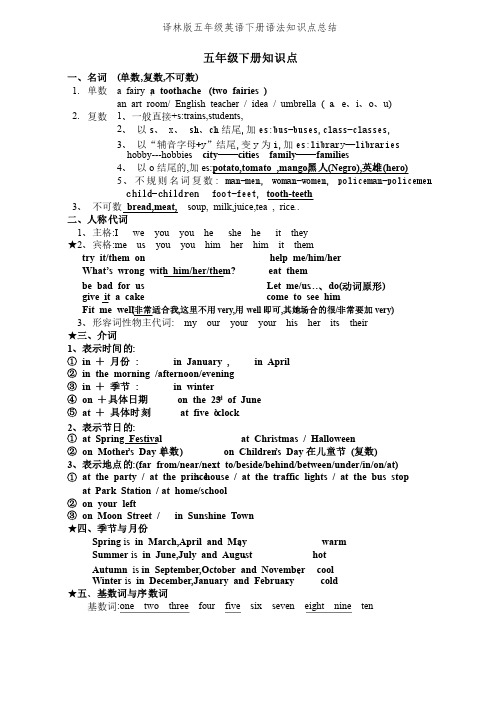
译林版五年级英语下册语法知识点总结五年级下册知识点一、名词(单数,复数,不可数) 1.单数a fairy , a toothache (two fairies )an art room/ English teacher / idea / umbrella an art room/ English teacher / idea / umbrella ( a ( a 、e 、i 、o 、u) 2.复数1、一般直接+s:trains,students, 2、以s 、 x x、、 sh sh、、ch 结尾结尾,,加es:bus-buses,class-classes,3、以“辅音字母+y”结尾以“辅音字母+y”结尾,,变y 为i,i,加加es:library es:library——libraries hobby---hobbies city ——cities family ——families4、以o 结尾的,加es:potato,tomato ,mango,黑人(Negro),英雄(hero)5、不规则名词复数: man-men, woman-women, policeman-policemen child-children foot-feet,tooth-teeth3、不可数bread,meat,soup, milk,juice,tea , rice …二、人称代词1、主格:I we you you he she he it they ★2、宾格:me us you you him her him it them try it/them on help me/him/her What What’’s wrong with him/her/them? eat them be bad for us Let me/us …、do(动词原形) give it a cake come to see him Fit me well (非常适合我,这里不用very,用well 即可,其她场合的很/非常要加very) 3、形容词性物主代词: my our your your his her its their ★三、介词1、表示时间的: ①in +月份: in January , in April ②in the morning /afternoon/evening ③in +季节: in winter ④on +具体日期on the 23rd of June ⑤at +具体时刻at five o ’clock 2、表示节日的: ①at Spring Festival at Christmas / Halloween ②on Mother ’s Day (单数) on Children ’s Day 在儿童节(复数) 3、表示地点的:(far from/near/next to/beside/behind/between/under/in/on/at) ①at the party / at the prince’s house / at the traffic lights / at the bus stop at Park Station / at home/school ②on your left ③on Moon Street on Moon Street / / in Sunshine Town ★四、季节与月份Spring is in March,April and May 、warm Summer is in June,July and August 、hot Autumn is in September,October and November 、cool Winter is in December,January and February 、cold ★五、基数词与序数词基数词:one two three four five six seven eight nine ten eleven twelve thirteen fourteen fifteen sixteen seventeen eighteen nineteen twenty twenty-one thirty ······ 序数词:first second third fourth fifth sixth seventh eighth ninth tenth eleventh twelfth thirteenth fourteenth fifteenth ·········twentieth twenty-first thirtieth thirty-second序缩写: 十九nineteen,九十ninety, 第十九nineteenth,第九十ninetieth; 六、哪些情况加动词原形: 1、can /should /would 2、let 3、助动词do/does 4、to 、练习:1、Su Hai should ______(take) some medcineLet’’s go and ______(have)a party、2、Let3、______(do)Nancy ______ (like) _______(dance) ? ’clock、4、Cinderella has to ______(come) back before 12 o七、哪些情况加动词ing 1、be 2、go 3、be good at 4、like 5、what /how about 注意:动词ing形式也叫作动词的现在分词(-ing),变化规则: (1)直接加ing:draw——drawing play——playing (2)以不发音的e结尾的,去e加ing:dance——dancing skate——skating make——making have——having write——writing live——living come------coming ride -------riding drive------driving (3)以重读闭音节结尾,呈现“辅元辅”结构的,双写末字母加ing: swim——swimming run——running chat——chatting sit——sitting put ——putting shop——shopping get-----getting Let’’s go ________(swim) this afternoon、练习:1、LetY ou’’re really good at _________(skate)、2、ou3、_____(be) your uncle ______(read) books now? 4、How about ________(watch) a film? ★八、现在进行时表示:正在进行的动作或存在的状态。
译林版小学五年级英语必须掌握的语法知识汇总
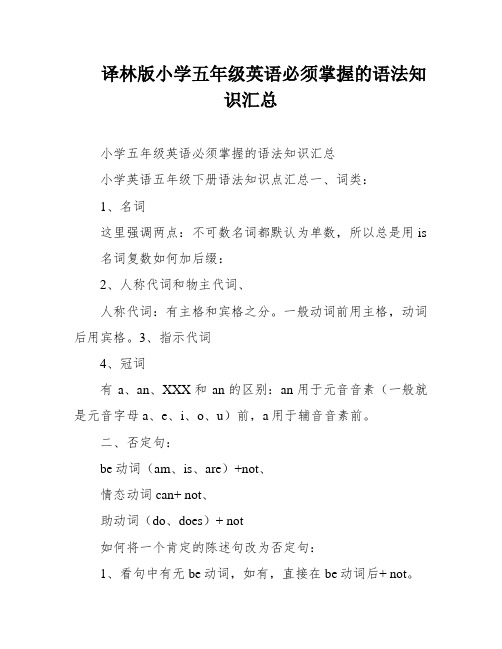
译林版小学五年级英语必须掌握的语法知识汇总小学五年级英语必须掌握的语法知识汇总小学英语五年级下册语法知识点汇总一、词类:1、名词这里强调两点:不可数名词都默认为单数,所以总是用is 名词复数如何加后缀:2、人称代词和物主代词、人称代词:有主格和宾格之分。
一般动词前用主格,动词后用宾格。
3、指示代词4、冠词有a、an、XXX和an的区别:an用于元音音素(一般就是元音字母a、e、i、o、u)前,a用于辅音音素前。
二、否定句:be动词(am、is、are)+not、情态动词can+ not、助动词(do、does)+ not如何将一个肯定的陈述句改为否定句:1、看句中有无be动词,如有,直接在be动词后+ not。
2、看句中有无情态动词,如有,直接在情态动词后+ not。
3、如上述二者都没有,就应用助动词+ not。
分四个步调:(1)一定陈述句中原本是没有助动词的,要加上去,位置在主语(某人或某物)后,动词前。
(2)一定助动词用do、does,根据句中动词,动词是真相的助动词就用do,动词是第三人称单数的助动词就用does,(3)在助动词后加not。
(4)原句中动词假如发生变化就要恢复成原形。
强调一点,有some的要考虑是否要用any。
三、一般疑问句:如何将一个肯定的陈述句改为一般疑问句:1、看句中有无be动词,如有,把be动词提到句首即可。
2、看句中有无情态动词,如有,把情态动词提到句首便可。
3、如上述二者都没有,就应把助动提到句首。
分四个步调:(1)一定陈述句中原本是没有助动词的,要加上去,位置在主语(某人或某物)后,动词前。
(2)一定助动词用do 照旧does,根据句中动词,动词是真相的助动词就用do,动词是第三人称单数的助动词就用does(3)把助动词后提到句首。
(4)原句中动词假如发生变化就要恢复成原形。
强调一点,有some的要考虑是否要用any。
四、非凡疑问句:表示疑问,有疑问词(在开头),回答有很多种可能。
【思维导图】译林版(三起)五年级下册英语知识点整理

【思维导图】译林版(三起)五年级下册英语知识点整理五年级的孩子们,你们好!为了帮助大家更好地掌握英语知识,我们将五年级下册的英语知识点整理成了思维导图。
通过思维导图,你们可以清晰地看到各个知识点之间的关系,从而更好地理解和记忆。
一、Unit 1主题:Goldilocks and the three bears知识点:人物:Goldilocks, three bears地点:house动词:is, are, have, eat, sleep, look, feel形容词:big, small, hard, soft, hot, cold,delicious介词:in, on, under, behind句型:How is/are ? It's/They're日常用语:Hello/Hi! Good morning/afternoon/evening! How are you? I'm fine, thank you. And you?二、Unit 2主题:A telephone call知识点:形容词:happy, sad, angry, tired, bored介词:at, in, on, under, behind句型:What can/can't do? can/can't日常用语:Can you ? Yes, I can./No, I can't. What are you doing? I'm三、Unit 3主题:Asking the way知识点:名词:road, street, park, cinema, library, museum介词:to, from, on, in, at句型:Where is/are ? It's/They're日常用语:Excuse me. How can I get to ? Go straight along and turn at It's about metres/metres from here.四、Unit 4主题:Road safety知识点:动词:is, are, have, can, must, may, should名词:road, street, traffic lights, crossing, zebra, sign介词:on, in, at, near句型:You must/may/should You can't日常用语:Look left/right. Cross the road. Be careful.五、Unit 5主题:A PE lesson动词:is, are, have, can, do, play, jump, run名词:PE, class, teacher, student, ball, net介词:in, at, on, under, over句型:What are you doing? I'm日常用语:Let's ! Come on! Well done!六、Unit 6主题:An interesting country知识点:动词:is, are, have, can, go, visit, see, do名词:country, city, town, village, mountain,river介词:in, at, on, under, behind日常用语:Hello! How are you? I'm fine, thank you. And you?七、Unit 7主题:A busy day知识点:名词:day, week, month, year, school, home, park介词:in, at, on, under, behind句型:What do you do on ? I日常用语:What time do you get up? I get up at八、Unit 8主题:At the weekends动词:is, are, have, can, go, visit, see, do名词:weekend, park, cinema, library, museum, shop介词:in, at, on, under, behind句型:What do you do at the weekends? I日常用语:Let's go to ! I'd like to Can we ? Yes, we can./No, we can't.九、Unit 9主题:Chinese festivals知识点:动词:is, are, have, can, go, visit, see, do名词:festival, Spring Festival, MidAutumn Festival, Dragon Boat Festival介词:in, at, on, under, behind句型:What do you do at ? I日常用语:Happy New Year! Happy MidAutumn Festival! Happy Dragon Boat Festival!十、Unit 10主题:Review and check知识点:复习前面所学知识点十一、五年级的孩子们,通过思维导图,你们可以更好地掌握五年级下册的英语知识点。
译林版五年级英语下册语法知识点总结
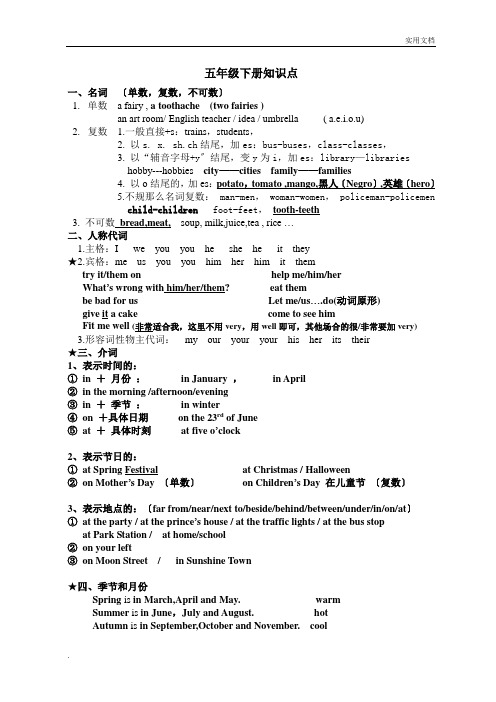
五年级下册知识点一、名词〔单数,复数,不可数〕1.单数 a fairy , a toothache (two fairies )an art room/ English teacher / idea / umbrella ( a.e.i.o.u)2.复数 1.一般直接+s:trains,students,2.以s. x. sh.ch结尾,加es:bus-buses,class-classes,3. 以“辅音字母+y〞结尾,变y为i,加es:library—librarieshobby---hobbies city——cities family——families4. 以o结尾的,加es:potato,tomato ,mango,黑人〔Negro〕,英雄〔hero〕5.不规那么名词复数: man-men, woman-women, policeman-policemenchild-children foot-feet,tooth-teeth3. 不可数bread,meat,soup, milk,juice,tea , rice …二、人称代词1.主格:I we you you he she he it they★2.宾格:me us you you him her him it themtry it/them on help me/him/herWhat’s wrong with him/her/them? eat thembe bad for us Let me/us….do(动词原形)give it a cake come to see himFit me well (非常适合我,这里不用very,用well即可,其他场合的很/非常要加very)3.形容词性物主代词:my our your your his her its their★三、介词1、表示时间的:①in +月份:in January ,in April②in the morning /afternoon/evening③in +季节:in winter④on +具体日期on the 23rd of June⑤at +具体时刻at five o’clock2、表示节日的:①at Spring Festival at Christmas / Halloween②on Mother’s Day 〔单数〕on Children’s Day 在儿童节〔复数〕3、表示地点的:〔far from/near/next to/beside/behind/between/under/in/on/at〕①at the party / at the prince’s house / at the traffic lights / at the bus stopat Park Station / at home/school②on your left③on Moon Street / in Sunshine Town★四、季节和月份Spring is in March,April and May. warmSummer is in June,July and August. hotAutumn is in September,October and November. coolWinter is in December,January and February. cold★五、基数词和序数词基数词:one two three four five six seven eight nine ten eleven twelve thirteen fourteen fifteen sixteen seventeeneighteen nineteen twenty twenty-one thirty ···序数词:first second third fourth fifth sixth seventh eighth ninth tenth eleventh twelfth thirteenth fourteenth fifteenth ···twentieth twenty-first thirtieth thirty-second序缩写:十九nineteen,九十ninety, 第十九nineteenth,第九十ninetieth;六、哪些情况加动词原形:1.can /should /would2. let3.助动词do/does4.to练习:1.Su Hai should ______(take) some medcine.2.Let’s go and ______〔have〕a party.3.______(do)Nancy ______ (like) _______(dance) ?4.Cinderella has to ______(come) back before 12 o’clock.七、哪些情况加动词ing1.be2. go3.be good at4.like5.what /how about注意:动词ing形式也叫作动词的现在分词〔-ing〕,变化规那么:〔1〕直接加ing:draw——drawing play——playing〔2〕以不发音的e结尾的,去e加ing:dance——dancing skate——skating make——making have——having write——writing live——livingcome------coming ride -------riding drive------driving〔3〕以重读闭音节结尾,呈现“辅元辅〞结构的,双写末字母加ing:swim——swimming run——running chat——chattingsit——sitting put ——putting shop——shoppingget-----getting练习:1.Let’s go ________(swim) this afternoon.2.You’re really good at _________(skate).3._____(be) your uncle ______(read) books now?4.How about ________(watch) a film?★八、现在进行时表示:正在进行的动作或存在的状态。
新译林版英语五年级下册语法知识归纳

新译林版英语五年级下册语法知识归纳一、名词1. 名词是指表示人、事、物、地点等具体或抽象概念的词语。
2. 可数名词可以和数词连用表示数量,如one cat、three apples。
3. 不可数名词不可以和数词连用,表示具体或抽象的事物,如milk、water。
二、动词1. 动词是指表示动作、状态或存在的词语。
2. 动词分为及物动词和不及物动词。
- 及物动词需要有宾语才能构成完整的谓语,如She likes apples。
- 不及物动词可以独立构成谓语,如I swim every day。
三、形容词1. 形容词是用来修饰名词或代词的词语。
2. 形容词可以表示人或物的特征、性质、状态等。
3. 形容词可以用来比较大小,常用词尾+er表示比较级,如taller、bigger。
4. 形容词可以用来最高级,常用词尾+est表示最高级,如tallest、biggest。
四、副词1. 副词是用来修饰动词、形容词或其他副词的词语。
2. 副词用来描述动作的方式、程度、时间等。
3. 副词可以用来比较程度,常用more或less表示比较级,如more beautiful、less careful。
4. 副词可以用来最高级,常用most或least表示最高级,如most beautiful、least careful。
五、代词1. 代词是用来代替名词的词语。
2. 代词可以替代人或物,在句子中充当名词的角色。
3. 代词包括人称代词、物主代词、指示代词、疑问代词等。
六、介词1. 介词是用来表达名词与其他单词(如动词、形容词等)之间的关系的词语。
2. 介词可以表示位置、方向、时间、原因等。
3. 常用的介词有in、on、at、from、to、with等。
七、连词1. 连词是用来连接词语、词组、句子等的词语。
2. 连词可以连接并列词语、并列词组或并列句子。
3. 常用的连词有and、but、or、so等。
八、语序1. 语序是指词语在句子中的顺序。
(完整版)译林版五年级下英语知识点

译林新版小学五年级下册知识点整理Unit 1知识点一、单词:because因为fairy仙女fit合适,合身have to不得不,必须mushroom蘑菇prince王子pick摘,拾take off脱下clothes衣服let让put on穿上understand明白,理解before在…以前late迟的try on试穿be bad for有害的pick摘leave…behind留下,丢下二、词组:去聚会at the party在聚会be sad伤心go to the party过得愉快come back回来take off脱下have a good timetry on试穿have to go必须走leave…behind留下,丢下在一棵树下look so nice看起来很漂亮在深林里under a treein the forest摘一个大红色的蘑菇对我们有害的pick a big red mushroomare bad for us没有漂亮的衣服或鞋子at the prince's house在王子的房子don't have any nice clothes or shoes三、句型:你为什么这么伤心?1. Why are you so sad ?因为我不能去参加聚会。
’t go to the party.2. Because I can3.Why?为什么?因为我没有漂亮的衣服或鞋子。
clothes and shoes.4.Because I don’t have any nice四、语法:can't = can not don't =do not知识点1:can的用法1)can表示能力,意思是“能,会”。
后面直接跟动词原形,用于一切人称和数。
Can的否定形式为can not,其缩写为“can’t。
如:We canspeak m uchEnglish now.我们现在能说英语了。
译林版五年级英语下册语法知识点总结
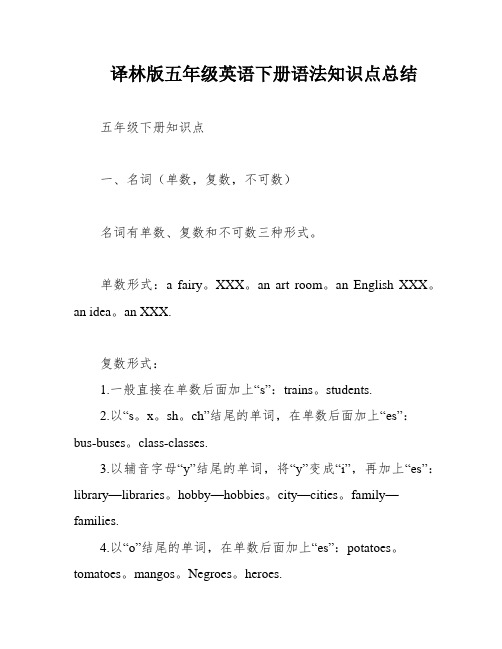
译林版五年级英语下册语法知识点总结五年级下册知识点一、名词(单数,复数,不可数)名词有单数、复数和不可数三种形式。
单数形式:a fairy。
XXX。
an art room。
an English XXX。
an idea。
an XXX.复数形式:1.一般直接在单数后面加上“s”:trains。
students.2.以“s。
x。
sh。
ch”结尾的单词,在单数后面加上“es”:bus-buses。
class-classes.3.以辅音字母“y”结尾的单词,将“y”变成“i”,再加上“es”:library—libraries。
hobby—hobbies。
city—cities。
family—families.4.以“o”结尾的单词,在单数后面加上“es”:potatoes。
tomatoes。
mangos。
Negroes。
heroes.5.不规则名词复数:man—men。
woman—women。
policeman—policemen。
child—children。
foot—feet。
XXX.不可数名词:bread。
meat。
soup。
milk。
juice。
XXX。
rice等。
二、人称代词人称代词分为主格、宾格和形容词性物主代词。
主格:I。
we。
you。
he。
she。
it。
they.宾格:me。
us。
you。
him。
her。
it。
them.形容词性物主代词:my。
our。
your。
his。
her。
its。
their.三、介词介词主要用于表示时间、地点、方式等。
表示时间的介词有:1.in + 月份:in January。
in April.2.XXX.3.in + 季节:in winter.4.on + 具体日期:on the 23rd of June.5.at + 具体时刻:XXX o’clock.表示节日的介词:During Spring Festival。
Christmas。
and Halloween。
people XXX。
新版译林英语五年级下册知识点整理
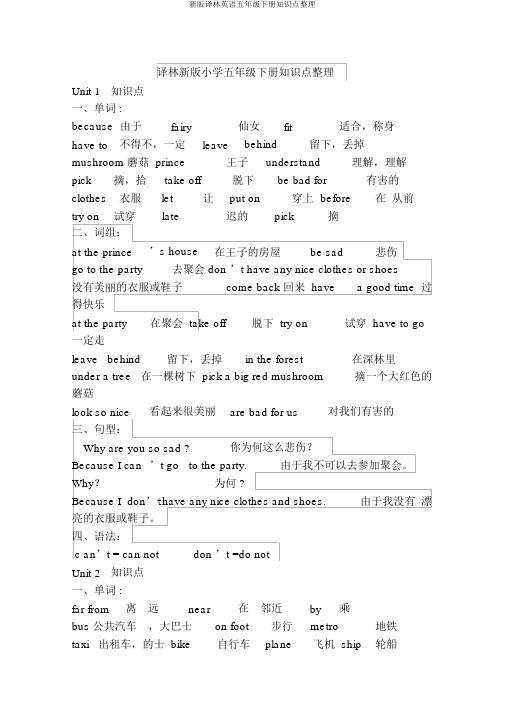
译林新版小学五年级下册知识点整理Unit 1知识点一、单词 :because 由于fairy仙女fit适合,称身have to不得不,一定leave behind留下,丢掉mushroom 蘑菇 prince王子understand理解,理解pick摘,拾take off脱下be bad for有害的clothes衣服let让put on穿上 before在从前try on试穿late迟的pick摘二、词组:at the prince’s house在王子的房屋be sad悲伤go to the party去聚会 don ’t have any nice clothes or shoes没有美丽的衣服或鞋子come back 回来 have a good time 过得快乐at the party在聚会 take off脱下 try on试穿 have to go 一定走leave behind留下,丢掉in the forest在深林里under a tree 在一棵树下 pick a big red mushroom摘一个大红色的蘑菇look so nice看起来很美丽are bad for us对我们有害的三、句型:Why are you so sad ?你为何这么悲伤?Because I can’t go to the party.由于我不可以去参加聚会。
Why?为何 ?Because I don’t have any nice clothes and shoes.由于我没有漂亮的衣服或鞋子。
四、语法:c an’t = can not don ’t =do notUnit 2知识点一、单词 :far from离远near在邻近by乘bus 公共汽车,大巴士on foot步行metro地铁taxi 出租车,的士 bike自行车plane飞机 ship轮船train city火车城市ride骑车show给看basket篮子二、词组:your new home你的新家very big很大far from school离学校远live on Moon Street住在月亮街上near City Library在城市图书室邻近come to school来学校by bus乘公共汽车on foot步行by metro乘地铁by taxi乘出租车 a taxi driver一位出租车司机in the park在公园里 can fly会飞show his bike to sam展现他的自行车给山姆看too young太小(年龄)sit in the basket坐在篮子里三、句型:Where do you live?你住在哪里?I live我住在 I live near/ far from我住在邻近 / 离远How do you come to school?你如何来学校的?I come to school我来学校Unit 3知识点一、单词 :along沿着,顺着 ask the way问路 ask for help 向求援full满的,饱的 get to抵达next to在旁边on your right在你的右边。
完整word版译林版五年级英语下册语法知识点总复习

五年级下册知识点一、名词(单数,复数,不可数)1.单数 a fairy , a toothachean art room/ English teacher / idea / umbrella ( a.e.i.o.u)2.复数 1.一般直接+s:trains,students,2.以s. x. sh.ch结尾,加es:bus-buses,class-classes,3. 以“辅音字母+y”结尾,变y为i,加es:library—libraries hobby---hobbies city——cities family——families4. 以o结尾的,加es:potatoes, tomatoes5.不规则名词复数: man-men, woman-women, policeman-policemen child-children foot-feet,tooth-teeth3. 不可数 bread,meat,soup, milk,juice,tea , rice …二、人称代词1.主格:I we you you he she he it they★2.宾格:me us you you him her him it themtry it/them on help me/him/her What's wrong with him/her/them? eat thembe bad for us Let me/us….give it a cake come to see him 3.形容词性物主代词:my our your your his her its their★三、介词1、表示时间的:① in +月份: in January , in April② in the morning /afternoon/evening③ in +季节: in winterrd of June on the 23+具体日期④on⑤ at +具体时刻 at five o'clock2、表示节日的:① at Spring Festival at Christmas / Halloween② on Mother's Day on Children's Day3、表示地点的:(far from/near/nextto/beside/behind/between/under/in/on/at)① at the party / at the prince's house / at the traffic lights/ at the bus stopat Park Station / at home/school② on your left③ on Moon Street / in Sunshine Town★四、季节和月份Spring is in March,April and May. warmSummer is in June,July and August. hotAutumn is in September,October and November. coolcold in December,January and February. is Winter★五、基数词和序数词基数词:one two three four five six seven eight nine teneleven twelve thirteen fourteen fifteen sixteen seventeeneighteen nineteen twenty twenty-one thirty ···序数词:first second third fourth fifth sixth seventh eighth ninthtenth eleventh twelfth thirteenth fourteenth fifteenth ···twentieth twenty-first thirtieth thirty-second序缩写:六、哪些情况加动词原形:1.can /should /would2. let3.助动词 do/does4.to练习:1.Su Hai should ______(take) some medcine.2.Let's go and ______(have)a party.3.______(do)Nancy ______ (like) _______(dance) ?4.Cinderella has to ______(come) back before 12 o'clock.七、哪些情况加动词ing1.be2. go3.be good at4.like5.what /how about 注意:动词ing形式也叫作动词的现在分词(-ing),变化规则:(1)直接加ing:draw——drawingplay——playing(2)以不发音的e结尾的,去e加ing:dance——dancing skate——skating make——making have——having write——writing live——living come------coming ride -------riding drive------driving(3)以重读闭音节结尾,呈现“辅元辅”结构的,双写末字母加ing:swim——swimming run——running chat——chattingsit——sitting put ——putting shop——shoppingget-----getting练习:1.Let's go ________(swim) this afternoon.2.You're really good at _________(skate).3._____(be) your uncle ______(read) books now?4.How about ________(watch) a film?★八、现在进行时表示:正在进行的动作或存在的状态。
江苏译林版英语五年级下册必背语法知识点

江苏译林版英语五年级下册必背语法知识点1.Be动词包括am、are、is三个。
2.“吃一日三餐”中的“吃”只能用have,不能用eat,因为eat指的是具体食物。
3.“It’s time to”后接动词词组,如“It’s time to eat the cake”,而“It’s time for”后接名词,如“It’s time for the cake”。
4.在英语句子中,时间和地点通常放在句子的开头或结尾。
5.Whose是“谁的”,后接名词,表示询问物品的主人;who’s是“谁是”,后接人,具体询问人是谁。
6.Fun表示有趣、乐趣,而XXX表示滑稽、好笑。
7.So表示“如此的、那么的”;very表示“很、非常”;too表示“太”。
这三个词语意思不同。
8.在一般现在时中,当主语是第三人称单数时,加助动词do,它会吸动词上的s。
改成疑问句时,do变成does,被它吸走后动词就变成原形了,例如“He has XXX”变成“Does he have XXX?”。
9.当单词的开头是元音发音时,an可以用在其前面。
10.打电话时常用的语言包括“May I speak to…”、“Yes。
this is…”、“Who’s that?”等。
11.有些单词本来就是复数,如trousers、glasses、noodles 等,加量词时仍保持复数形式,如“a pair of trousers”、“a bowl of noodles”。
12.不可数名词可以通过加量词变成可数,如“a pair of shoes”、“a bowl of soup”。
13.时间和日期相关的词汇都可以用“on”,包括“on Monday”、“on New Year’s Eve”等。
14.“舞蹈课”和“画画课”可以变成动词形式的“dancing lesson”和“drawing lesson”。
15.Any通常用在否定句和疑问句中。
16.在Can I have some…和Would you like some…等问句中,不需要使用any。
江苏译林版英语五年级下册必背语法知识点

后面加er或or,
55. after和before
after是“在……之后”,before是“在……之前”,这两个词语表示的时间的前后
56. do是什么类型的动词
助动词,是帮助句子结构成立的动词
57. do my homework和助动词do有什么不同
do my homework的do是“做”的意思,助动词do本身没有意思,它的存在只是为了帮助句子结构成立
What
24. 如果是ill、fine、tired等感觉不知道,用什么提问
How
25. 如果是the duckon thelake、theteacherin the classroom这类,用什么提问
Which
如果是数量不知道,用什么提问
用How many,后面要接复数,如果是there be的句型,不要忘记写are there如There arefortystudents in my class.How many studentsare therein your class
26. 如果是There be句型中的东西不知道,怎么提问
无论画线部分是单数或复数都用“What’s+地点”
27.动词后如果要接人,这个“人”应该如何变化
人要用宾格,如show me、let him
28. with后面如果要接人,怎么办
用宾格,如with them、with her
29. “在几点钟”用什么介词
12. 不可数名词如何变成可数的
加量词,如a pair of / a bowl of/ a…of
13.和day有关都用什么
用on,如果是Eve也用on
14. “舞蹈课”“画画课”这些lesson前的动词要怎样
译林版五年级英语下册语法知识点总复习汇总
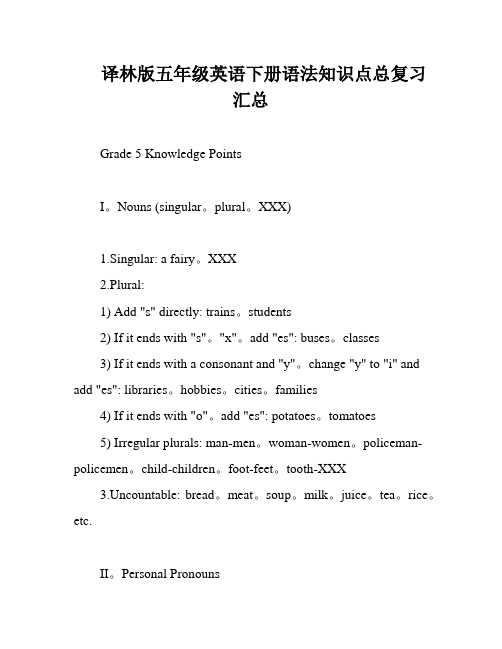
译林版五年级英语下册语法知识点总复习汇总Grade 5 Knowledge PointsI。
Nouns (singular。
plural。
XXX)1.Singular: a fairy。
XXX2.Plural:1) Add "s" directly: trains。
students2) If it ends with "s"。
"x"。
add "es": buses。
classes3) If it ends with a consonant and "y"。
change "y" to "i" and add "es": libraries。
hobbies。
cities。
families4) If it ends with "o"。
add "es": potatoes。
tomatoes5) Irregular plurals: man-men。
woman-women。
policeman-policemen。
child-children。
foot-feet。
tooth-XXX3.Uncountable: bread。
meat。
soup。
milk。
juice。
tea。
rice。
etc.II。
Personal Pronouns1.Subject pronouns: I。
we。
you。
he。
she。
it。
they2.Object pronouns:1) me。
us。
you。
him。
her。
it。
them2) Examples: Try it/them on。
Help me/him/her。
What's wrong with him/her/them。
Meat them。
Be bad for us。
Let me/us。
- 1、下载文档前请自行甄别文档内容的完整性,平台不提供额外的编辑、内容补充、找答案等附加服务。
- 2、"仅部分预览"的文档,不可在线预览部分如存在完整性等问题,可反馈申请退款(可完整预览的文档不适用该条件!)。
- 3、如文档侵犯您的权益,请联系客服反馈,我们会尽快为您处理(人工客服工作时间:9:00-18:30)。
五年级下册知识点一、名词(单数,复数,不可数)1.单数 a fairy , a toothache (two fairies )an art room/ English teacher / idea / umbrella ( a、e、i、o、u)2.复数1、一般直接+s:trains,students,2、以s、 x、 sh、ch结尾,加es:bus-buses,class-classes,3、以“辅音字母+y”结尾,变y为i,加es:library—librarieshobby---hobbies city——cities family——families4、以o结尾的,加es:potato,tomato ,mango,黑人(Negro),英雄(hero)5、不规则名词复数: man-men, woman-women, policeman-policemenchild-children foot-feet,tooth-teeth3、不可数bread,meat,soup, milk,juice,tea , rice …二、人称代词1、主格:I we you you he she he it they★2、宾格:me us you you him her him it themtry it/them on help me/him/herWhat’s wrong with him/her/them? eat thembe bad for us Let me/us…、do(动词原形)give it a cake come to see himFit me well (非常适合我,这里不用very,用well即可,其她场合的很/非常要加very)3、形容词性物主代词: my our your your his her its their★三、介词1、表示时间的:①in +月份: in January , in April②in the morning /afternoon/evening③in +季节: in winter④on +具体日期on the 23rd of June⑤at +具体时刻at five o’clock2、表示节日的:①at Spring Festival at Christmas / Halloween②on Mother’s Day (单数) on Children’s Day 在儿童节(复数)3、表示地点的:(far from/near/next to/beside/behind/between/under/in/on/at)①at the party / at the prince’s house / at the traffic lights / at the bus stopat Park Station / at home/school②on your left③on Moon Street / in Sunshine Town★四、季节与月份Spring is in March,April and May、warmSummer is in June,July and August、hotAutumn is in September,October and November、coolWinter is in December,January and February、cold★五、基数词与序数词基数词:one two three four five six seven eight nine teneleven twelve thirteen fourteen fifteen sixteen seventeeneighteen nineteen twenty twenty-one thirty ···序数词:first second third fourth fifth sixth seventh eighth ninth tenth eleventh twelfth thirteenth fourteenth fifteenth ···twentieth twenty-first thirtieth thirty-second序缩写:十九nineteen,九十ninety, 第十九nineteenth,第九十ninetieth;六、哪些情况加动词原形:1、can /should /would2、let3、助动词do/does4、to练习:1、Su Hai should ______(take) some medcine、2、Let’s go and ______(have)a party、3、______(do)Nancy ______ (like) _______(dance) ?4、Cinderella has to ______(come) back before 12 o’clock、七、哪些情况加动词ing1、be2、go3、be good at4、like5、what /how about注意:动词ing形式也叫作动词的现在分词(-ing),变化规则:(1)直接加ing:draw——drawing play——playing(2)以不发音的e结尾的,去e加ing:dance——dancing skate——skatingmake——making have——having write——writing live——livingcome------coming ride -------riding drive------driving(3)以重读闭音节结尾,呈现“辅元辅”结构的,双写末字母加ing:swim——swimming run——running chat——chattingsit——sitting put ——putting shop——shoppingget-----getting练习:1、Let’s go ________(swim) this afternoon、2、You’re really good at _________(skate)、3、_____(be) your uncle ______(read) books now?4、How about ________(watch) a film?★八、现在进行时表示:正在进行的动作或存在的状态。
(now/listen/look)构成: be(is/am/are) +动ing例:特殊疑问句1、What are you doing? I am sweeping the floor、2、Where are you going? I am going to the playground、一般疑问句1、Are you cooking tomato soup? Yes,I am、/No, I’m not、2、Is he looking for some juice? Yes, he is、/No,he isn’t、九、一般现在时表示:经常发生的动作或存在的状态,常与表示频率的时间状语连用。
(always 总就是;usually 通常;often经常;sometimes有时候) 例:What do you (usually) do on your birthday?What do you eat at Spring Festival?★注意主语就是三单时,动词要变为动三单形式,变化规则如下:1) 一般情况下,动词后面直接加-s、: climbs / takes/ picks2) 以ch,sh,s,x 或o 结尾的动词,在后面加-es、例: teaches , watches, does , goes, catches ,brushes3) 以辅音字母+ y结尾的动词,把y变为i 再加-es、try--tries十、辨析2、与①and (Su Yang and I) are helping her、②with ( We )often have a big dinner with (our parents) 、3、也①too It’s Su Yang’s birthday too、(句末)②also It’s also Su Yang’s birthday、(句中)③either They should not eat or drink either、(否定句)4、Be动词(is/am/are)①I am / you are②单数/不可数is / 复数are★5、想要①want =would like + 名词She wants a big cake、=②want to=would like to +动原She wants to buy a big cake、=(注意:不要瞧到like就跟doing,like doing就是喜欢做某事)★6、就是······的时候了。
It’s time to have lunch、(to +动原)It’s time for lunch、(for+名词)★7、look for 寻找(过程) Liu Tao is looking for some milk、find 找到(结果) Yang Ling cannot find the bookshop、8.or (通常用于否定句) and (通常用于肯定句)十一、易错词汇与词组1、who’s (就是谁) whose(谁的) he’s(她就是) his (她的)there are有they’re 她们就是these 这些pretty 漂亮的present 礼物parent 父或母read 读ride 骑2、play basketball play the piano play with Kitty the cat3、sweep the floor (区分:扫,洗,擦)4、clean the car / table clean the classroom / library5、wash clothes / the dishes / some vegetables6、give … to / send…to / write…to / show…to / buy…for7、fit / hear well、work on a big ship、too young/late/many sweets8、what / where / when / who / whose / how many/ how old /which(哪个)十二、文化板块1、I like reading fairy tales、I like reading stories about(关于) the Monkey King and Nezha、2、In the UK , we ask "Where's the toilet?"In the U S, we ask "Where's the re s troom?"3、You have a fever、Your temperature is 102°F、 102?It's 39°C、4、I eat with chopsticks、 (Chinese)I eat with a knife and fork、 (Western)西方人5、Halloween is on the thirty–first of October、Children usually dress up、They knock on people's doors and shout "Trick or treat?" for sweets、6、People in the West usually open their presents as soon as th ey receive them、★十三、四会单词与句型单词: why,because,clothes,let,put on,have to,take off,moon,street,near,city,by,bus,on foot,metro,taxi,bike,plane,train,take,get on,get off,walk,hospital,shop,zoo,film,stop,feel,should,have a rest,toothache,anything,clean,cook,busy,garden,sweet,vegetable,tomato,potato,lookfor,love,bread,January,February,call,May,June,September,October,November,birthday,April ,game,March,July,August,December,play,answer句型:1、Why are you sad? Because I can’t go to the party、(问原因)2 、How do you come to school? I come to school by bus/taxi、(问交通工具)3、Excuse me, how do I get to the cinema/hospital···? (get there)You can get on/off the metro/bus at…(问路、指路)Then, walk to/go along …、(问路)、You can see …on your left/right、4、What’ wrong with you? I have a fever/headache/cold/toothache、You should/shouldn’t…(问身体状况)What’ wrong with him/her? He/She has a fever、How do you feel now? I feel better(好些) 、/ cold/ hungry/…5、What are you/they doing? I am/We are/They are sweeping the floor、What is he/she doing? He/She is cooking dinner、6、Are you cooking meat? No, I’m not、I’m washing some vegetables、How’s the meat/soup/…? It’s yummy/nice、I can’t wait! I love it! (vegetable salad s)7、The Spring Festival is in January or February、People eat rice dumplings at this festival、(注意festival不就是节日名称时不要大写)8、When’s your birthday?It’s on the _______of ______、(四月21日)What do you do on your birthday?I usually···(have a party/buy a birthday cake/eat noodles/···)(问生日)其她重要句型1.Because I don’t have any nice clothes、=Because I have no nice clothes、2.I come to school on foot、= I walk to school、3.Yang Ling gets to Su Yang’s home by metro、=Yang Ling takes a metro to Su Yang’s home4.Can I go to school by bike? = Can I ride a bike to school?No,you can’t、5.It’s far from school、= It’s not near school、6.Let’s take the metro、7.Bobby is very happy to help them、8.……。
